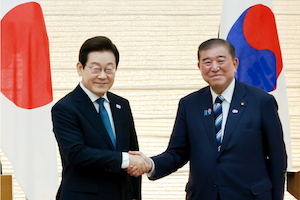South Korea-Japan Ties Mark 60 Years: Lee Jae-myung Makes Rare August Visit to Tokyo to Promote Shuttle Diplomacy

Japanese Prime Minister Shigeru Ishiba and South Korean President Lee Jae-myung held their first summit on Saturday, the 23rd, at the Prime Minister’s Office in Tokyo, stressing the importance of setting aside past differences in the face of challenges from their mutual ally, the United States.
The two countries agreed to cooperate in areas such as clean energy, artificial intelligence, declining birthrates, population aging, and disaster prevention. Both sides reaffirmed that South Korea and Japan, together with the United States, would work to end North Korea’s nuclear and missile development programs. This marks the first time since the establishment of diplomatic relations in 1965 that a South Korean president has chosen Japan as the first destination for an overseas trip, and the first time since then that a South Korean leader has visited Japan before visiting the United States. Japanese officials noted that this shows Lee’s strong emphasis on strengthening Seoul-Tokyo relations. Historically, disputes over wartime issues have repeatedly hindered South Korea-Japan ties and trilateral coordination with Washington.
“Cooperation between our two countries is more important than ever,” Ishiba said. “Since the president took office, we have shared the same perspective, and I find that very encouraging.” Ishiba currently faces pressure from right-wing rivals within the ruling party to resign following July’s election setback. Lee expressed to Ishiba his hope to promote dialogue and cooperation, including shuttle diplomacy, not only between the two leaders but also through exchanges among government officials of both nations.
According to the Yomiuri Shimbun, no South Korean president has visited Japan in August since President Roh Tae-woo in 1987. August 15 is Korea’s Liberation Day, commemorating Japan’s surrender in World War II and the founding of the South Korean government. Senior Japanese Foreign Ministry officials remarked that the period around Liberation Day has traditionally been a sensitive time in South Korea regarding historical issues, making visits aimed at improving bilateral ties especially difficult.
Saturday’s summit was the first in 17 years, culminating in a joint statement in which both leaders pledged to look toward the future. Tokyo reiterated its “deep remorse and heartfelt apology” for Japan’s harsh colonial rule. Last week, in a speech marking Korea’s liberation from Japanese colonial rule, Lee called on both sides to overcome past grievances while urging Japan to face unresolved issues in order to maintain trust.
Lee and Ishiba jointly affirmed that “in a rapidly changing international environment, unwavering trilateral cooperation among South Korea, the United States, and Japan is vital,” and agreed to foster a positive cycle of stronger cooperation that advances Seoul-Tokyo relations.
Lee will remain in Japan on August 23–24 before heading directly to the United States for a summit with President Donald Trump. This indicates that under Lee Jae-myung’s leadership, inaugurated in June, South Korea has not shifted its stance on cooperation with Japan or trilateral ties with the United States and Japan.
- 117 reads
Human Rights
Fostering a More Humane World: The 28th Eurasian Economic Summi

Conscience, Hope, and Action: Keys to Global Peace and Sustainability

Ringing FOWPAL’s Peace Bell for the World:Nobel Peace Prize Laureates’ Visions and Actions

Protecting the World’s Cultural Diversity for a Sustainable Future

Puppet Show I International Friendship Day 2020

